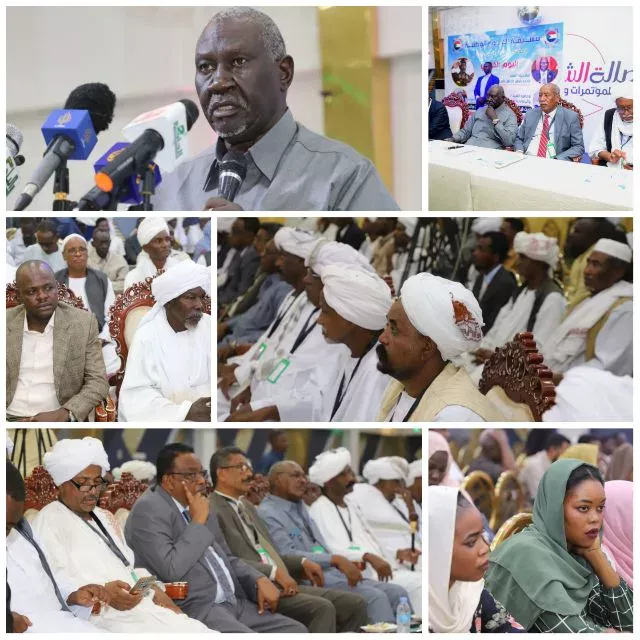The Vice-President of the Sovereignty Council addresses the General Conference of the Coordination of National Forces

Port Sudan 11/11/2024 AD
Today, the Vice President of the Transitional Sovereignty Council, Commander #Malik_Aqar_Ayer, addressed the session of the General Conference for the Coordination of National Forces, in the presence of the Minister of the Federal Government, the Governor of the Red Sea, the representative of the General Intelligence Service and a number of heads of parties, blocs and civil administrations.
His Excellency discussed the Sudanese political experience since independence, indicating that wars remained the distinctive feature of Sudan's political history after independence until the secession of South Sudan, caused by the structural imbalance of the post-independence state, which failed to resolve the problem. the founding questions, the constitutional principles and the foundations of the construction of a State of citizenship without discrimination.
His Excellency said that political forces and societal entities since independence have not agreed on a clear constitutional formula to manage Sudan and define the institutions that assume power and resources on behalf of the people. There is a need to clarify the form and system of government, including the relationship between the center and the region, the distribution of power and resources, and the definition of authoritarian institutions such as the army and regular forces. The relationship between religion and State, identity and external relations.
The member of the Sovereignty Council referred to the recent experience and the success of the struggle won by our people on all fronts and by various means, whether through peaceful mass action, armed struggle or diplomatic pressure, who uprooted the rescue system and made the December Revolution successful thanks to the cohesion of all layers of the Sudanese people.
His Excellency said that over the thirty years, the country has inherited several diseases, the effects of which are still evident in the power struggle that broke out between yesterday's allies, freedom and central change after the revolution, the exploitation of the noble dreams of the revolution for self-service, foreign agendas, employment and competition for power during the transition period, which should have come through a well-thought-out vision or program, far ethnic and regional one-upmanship practiced by some in political organizations or by rebel militias to gain influence and political presence without ideas in the service of the people. The matter was not limited to politicians alone, as some civil society organizations showed quarrels and rejection of others.
Aqar explained that the political crisis led to the change of power on October 25, 2021 AD. Showing their serious efforts at the time to resolve the crisis and smoothly return to the path of democratic transformation and to bring back Dr. Abdullah Hamdok, who in turn was blackmailed by some political parties who subjected him to insults and insults until he submits. his resignation and left the country for the Emirates. Note that these political parties are the same ones that are trying to bring him back today and have fallen prey to his conditions from that day forward, and have paved the way for a military competition for the country. militia, who refused to engage in military reform and made secret alliances for a failed coup attempt on April 13, 2023, explaining that coups throughout the ages have been led by military courageous, but Hemedti and the mercenaries of the rapid support and their program The workers lack any military or moral honor, which led them to spread the spirit of chaos and the spiral of global war that the country is witnessing today after the failure of their coup and their claim that they are fighting the Remainers and the State of 56.
His Excellency spoke about the current political movement, the Sudanese vision and the positive and negative experiences in the history of political systems, whether political parties, civil society organizations or military systems, explaining that political parties and military systems are partners in failure, highlighting the need to create an agreed scientific approach to establishing the Sudanese state.






